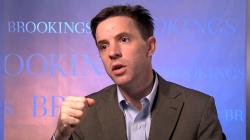

2:00 pm EST - 3:00 pm EST
Past Event
2:00 pm - 3:00 pm EST
1775 Massachusetts Avenue, NW
Washington, DC
20036
In recent years Turkey has emerged as a global player with a vibrant economy and an ambitious new foreign policy characterized by growing self-confidence and enhanced activism. However, in many ways, Turkey’s lingering problem dealing with its Kurdish minority remains the country’s Achilles’ heel. The ruling Justice and Development Party (AKP) government faces multiples challenges and new opportunities on the Kurdish front, and the issue has real potential to shape next year’s national elections. Even more broadly, the future of Turkish democracy and the success of its regional foreign policy may depend on how Ankara will handle the expectations of Turkey’s Kurdish community.
On December 10, the Center on the United States and Europe at Brookings (CUSE) hosted a discussion of the challenges and opportunities that Turkey faces in its effort to resolve the 26-year Kurdish insurgency. The discussion featured three leading experts on Turkey and its Kurdish ethnic minority: Brookings Nonresident Senior Fellow Ömer Taşpınar; Henri Barkey of Lehigh University and the Carnegie Endowment for International Peace; and Gönül Tol, director of the Center for Turkish Studies and scholar-in-residence at the Middle East Institute. The event was organized in partnership with the Turkish Industry and Business Association (TUSIAD).
Senior Fellow Justin Vaïsse, CUSE director of research, provided introductory remarks and moderated the discussion. After the program, the panelists took audience questions.


Alexander Noyes, Calin Trenkov-Wermuth
February 5, 2026

Vanda Felbab-Brown
June 23, 2025

Landry Signé
May 27, 2025